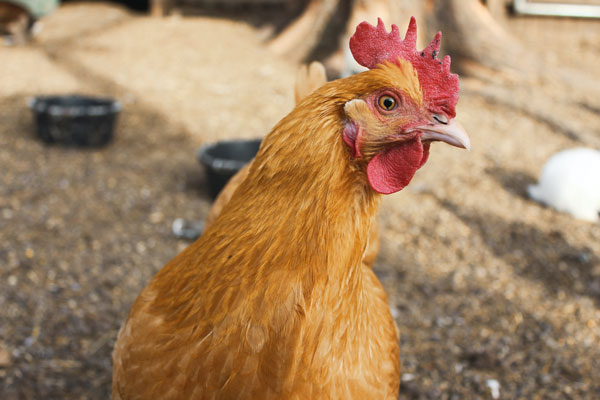A Chicken is for Life
Multiple suppliers have reported a surge in purchases of chickens in the last few years, partly due to supply issues from Covid, and also the push to reduce food miles. Many people also want the security of knowing the eggs have been produced from free range, high welfare hens. This trend has been echoed locally as well, with one of our rare breed farmers reporting a massive increase in demand. But do you know what your chickens need?
Nutrition:
- The best way to provide for all your chickens nutritional needs is to feed them a commercially available formulation.
- Adult laying chickens need a high level of calcium in their diet to allow them to form strong shells on their eggs. A diet inadequate in calcium will result, weak broken eggs, unsuitable for consumption.
- Low calcium levels can also cause egg bind, where the chicken is unable to pass/lay the egg, this condition is serious often resulting in peritonitis and death and needs immediate veterinary attention.
- Chickens need grit and stones! They have a crop, which is an enlarged portion of the oesophagus (food pipe) which sits at the base of the neck, this structure is used for preliminary digestion of grains and grass, and grit is essential for helping to break up the food. This can either be provided artificially in a feed container or the hens can be allowed to roam and find their own grit.
- Egg production requires a lot of water so the provision of clean, fresh water is essential, chickens like to mess it up though, so raising it or providing only a small opening for access will save you a lot of time constantly changing it!
Accommodation/environment:
- Chickens love to ‘scratch’ so allowing them to roam during the day is ideal, if not then using a feed that can be scattered on the ground is excellent for mental enrichment. A group of bored chickens often results in self mutilation, feather plucking and pecking of each other.
- Try to avoid scattering more than the birds will consume during the day however as left over feed will attract rodents.
- Chickens like to ‘come home to roost’ and need a safe, secure place at night to roost (sleep), we recommend the accommodation can be locked at dusk to keep the chickens safe. This is where they are likely to lay their eggs so must be kept clean, especially if you intend to eat the eggs.
- Remember foxes are clever and persistent, so regular examination of fences, latches and buildings is essential, especially in the spring when vixens are raising cubs.
Egg laying process:
- Chickens will only lay if they feel safe and secure so don’t be surprised if it takes a while for them to start laying after purchase.
- Chickens reach egg laying age at 15-22 weeks, depending on breed and season.
- Most breeds have a 3-5 year laying period, generally those chickens that lay daily or close to it tend to have a shorter laying lifetime.
- In nature a hen will lay her fertilised eggs over the course of approximately a week, but only when she starts to sit on them (brood) will they begin to develop. An egg takes 21 days to develop once brooding starts. Therefore if you have a rooster running with your hens, but want to eat the eggs, it is important to remove the eggs daily and keep them cool to prevent them starting to develop.
- In nature birds only lay in the spring once they are receiving 12hrs of daylight, although a lot of breeds have been bred to lay for longer periods of time, don’t be surprised if the laying drops off once days get shorter. You can try to increase laying by providing artificial light in the coop, but be aware they will need extra nutrition over the colder winter months to maintain body condition if laying.
- The egg laying process is very sensitive, any change to environment as well and illness will result in laying stopping, they will also stop laying during their moult period. If one of your chickens stops laying for no apparent reason this could be early indication of illness, so please give us a call.
Parasites
- Poultry are very susceptible to red mites, these mites are visible to the naked eye, but can be hard to diagnose as they live in cracks and crevasses of the poultry house and come out at night to feed (blood) off the chickens. Mites can explode in number in warm weather, resulting in anaemia and sometimes death, so it is advised to monitor for them regularly by checking the housing. The chickens may also show signs of restlessness and itching.
- Prevention; regular use of disinfection sprays on the housing. Diatomaceous earth is also helpful if used to layer the housing beneath the bedding.
- Chickens are susceptible to a few species of worms, three types of gut worm, and one that lives in the throat (gape worm). It is recommended that bedding is cleaned out regularly and ranging area/pasture is rotated regularly to avoid a build up of worms/eggs. Animals can be routinely wormed with Flubendazole (every 3-4months) to help prevent disease. This product can be sourced from our practice.
Further information;
- Please feel free to give us a call if you have any queries about the health or husbandry of your chickens. Remember chickens are able to mask signs of illness very effectively so they are often sicker than they appear.
- A good source of knowledge for all things poultry based is the Chicken Vet website: https://www.chickenvet.co.uk/



